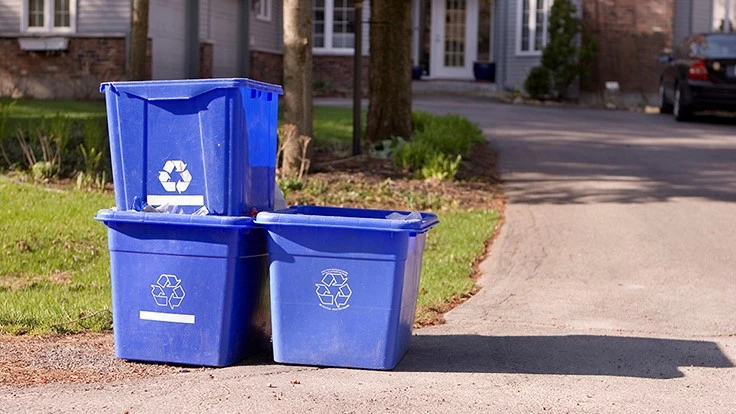
Product and packaging producers will soon fund the cost of municipal recycling in Ontario.
The province of Ontario has announced that it will shift operating costs for its Blue Box Program from municipal taxpayers to the producers of products and packaging collected through the program as it adopts extended producer responsibility (EPR) legislation.
Jeff Yurek, Ontario minister of the Environment, Conservation and Parks, and Steve Clark, Ontario minister of Municipal Affairs and Housing, announced the change Aug. 15 while at Toronto-based Canada Fibers.
"Transitioning the Blue Box program to full producer responsibility will promote innovation and increase Ontario's recycling rates while saving taxpayers money," Yurek said. "This shift is a big step towards diverting waste, addressing plastic pollution and creating a new recycling economy that everyone can be proud of in Ontario."
Ontario is issuing direction to Stewardship Ontario outlining the next steps and timelines to transition the program to EPR starting in 2023.
Over the coming year, Ontario will develop and consult on regulations to support the new producer responsibility framework for the Blue Box Program. Once EPR is fully in place, recycling across the province will be more consistent, with a standard list of materials that can be recycled, a news release from the Ministry of Environment, Conservation and Parks states.
Based on recommendations from special advisor David Lindsay's report on recycling and plastic waste, the Blue Box Program will transition to EPR in phases over a three-year period. This approach will provide time to consult with the public, stakeholders and Indigenous communities while also providing certainty for municipalities and adequate time for producers to engage service providers, the news release says. The first group of municipalities or First Nations will transfer responsibility of their programs to producers starting Jan. 1, 2023. By Dec. 31, 2025, producers will be fully responsible for providing blue box services provincewide.
Starting this fall, Ontario will begin early engagement with stakeholders, including the municipal and industry stakeholder working group that took part in Lindsay's previous mediation sessions.
The Blue Box Program will continue to be convenient and accessible for the people of Ontario, the news release states. Residents who currently receive municipal blue box services will continue to receive them throughout the transition period. Once producers are fully responsible for the program, Ontarians will experience the same or improved access to blue box services across the province, the Ministry of the Environment, Conservation and Parks says.
Reducing plastic waste and litter and making producers responsible for the end-of-life management of their products is a key part of the Made-in-Ontario Environment Plan commitment to balance a healthy economy and a healthy environment and keep our province clean and beautiful, the ministry says.
Latest from Waste Today
- Meridian Waste acquires NC hauling firm
- SWANA webinar focuses on Phoenix recycling collaboration
- IntelliShift honored at IoT Breakthrough Awards
- Glass Packaging Institute applauds regulation change
- Paper recycling is focus of 2 January webinars
- Disruption likely for material flows in mid-January
- Florida composting event takes place at worksites
- NC State research could improve predictions for solid waste management





